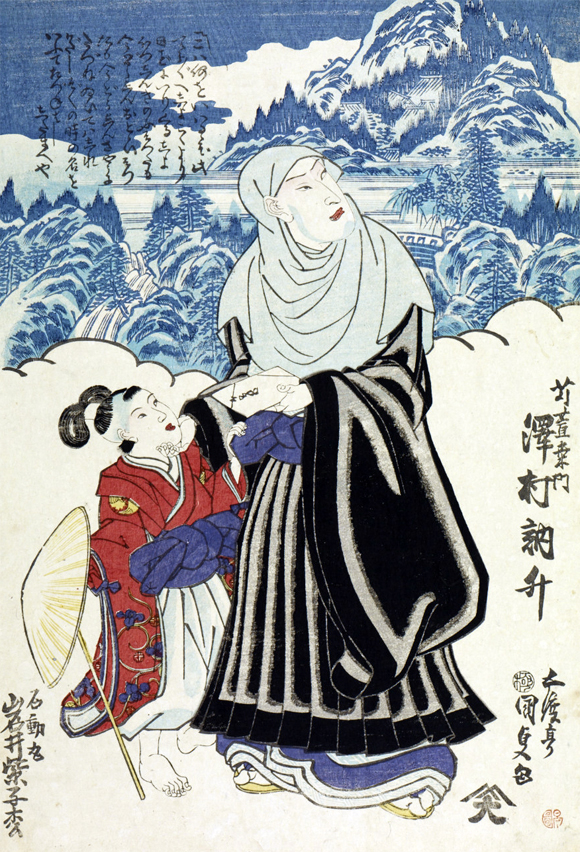| KďYASAN |
| Play title | Karukaya D˘shin Tsukushi no Iezuto Karukaya D˘shin and the Souvenir of Tsukushi [1] |
| Common title | K˘yasan |
| Authors | Namiki S˘suke Namiki J˘suke |
| History |
The play "Karukaya D˘shin Tsukushi no Iezuto" was originally written for the puppet theater (Bunraku) and staged for the first time in the 8th lunar month of 1735 in ďsaka at the Toyotakeza. It was adapted for Kabuki the following year and staged for the first time in the 3rd lunar month of 1736 in ďsaka at the Kado no Shibai (unknown casting). |
| Structure |
"Karukaya D˘shin Tsukushi no Iezuto" is made up of 5 acts. "K˘yasan" is an important scene of the fifth act. |
| Key words |
Buzen Chikuzen Daimy˘ Gidayű Ky˘gen Jidaimono Jiz˘ Karukaya Karukaya D˘shin Karukaya D˘shin Monogatari Kat˘ Saemon Shigeuji K˘ga Jisshu Kowakare K˘yasan Matsu Nyűd˘ Okugata Tsukushi |
| Summary |
Introduction The Kyűshű daimy˘ Kat˘ Saemon Shigeuji, sick of the hardness of humanity, has made up his mind to become a Buddhist priest. He entered priesthood on Mount K˘ya and has changed his name to Karukaya D˘shin. His okugata Maki-no-Kata and his son Ishid˘maru have come near Mount K˘ya, searching for him. As all women and impure men are prohibited from making the ascent to this sacred place, Maki-no-Kata has to stay at an inn at the foot of the mountain while Ishid˘maru goes alone to search for his lost father, who has made the vow to Buddha not to see his wife and children again in his life. K˘yasan Ishid˘maru, leaning against a walking cane, has made the long and difficult journey up the mountain and encounters along the trail a group of priests. There are Anshinb˘, Kietsub˘, S˘etsub˘, Gienb˘ and, the last but not the least, Karukaya D˘shin. Ishid˘maru tells the priests he is looking for a "new priest" and the priests say this is very difficult question because of the vastness of the temple complex and the huge number of subtemples. New people enter priesthood every day at each of the 990 temples. He tells them that he is looking for his father, who parted from him when he was only 2 years old. He also tells them that he comes from the province of Tsukushi. The name of this province draws Karukaya D˘shin's attention. He asks who the boy is searching for and when Ishid˘maru answers it is Kat˘ Saemon Shigeuji, the priest realizes this young and courageous boy is indeed his son. He would like to admit his identity, but when he became a priest he made a strict vow to Buddha that he would cut off all ties with human society and give up all his worldly affections. He says that if the boy's father were to hear that his son had made the difficult journey from Tsukushi to Mount K˘ya, he would be very proud and glad. But, now, Ishid˘maru should go home to his mother as soon as possible because, if he would meet his father here, his father would not be able to introduce himself to his son. Anshinb˘ also tells Ishid˘maru that he should leave before it gets dark. The priests exchange greetings with each other as they go back to their respective temples. Karukaya D˘shin sees them off. At the same time, a Buddhist song from a nearby temple, a sacred song about Jiz˘, the guardian deity of children, can be heard. Karukaya, alone with Ishid˘maru, is left in deep thought. Ishid˘maru tells his sad story to Karukaya D˘shin. He says that he and his mother came together after the war led by ďuchi Yoshihiro in Tsukushi. His mother is now at an inn at the foot of Mount K˘ya. But she fell sick on the road and she may die pretty soon. Her only wish is to meet her husband one last time. Ishid˘maru begs the priest to tell this story to his father so that they can meet just once before she dies. Both Karukaya D˘shin and Ishid˘maru bitterly weep. Because of the tears on his face, Ishid˘maru guesses this priest full of sympathy for him is none other than his father. Just as Karukaya is about to weaken, he hears the voice of his abbot Ajari who tells him he must not forget his vows. He finally rejects Ishid˘maru, who is clinging to him, and tells him that the nyűd˘ Shigeuji, who was indeed here, went on a journey to practice austerities far from here. Ishid˘maru must return to his mother immediately. Karukaya gives him some special medicine for her. He tells the boy to leave the mountain while there is still light and without revealing his identity, sadly Karukaya D˘shin parts from his son Ishid˘maru [2]. He sees him off, climbing a slope and putting his hand on the branch of a pine tree (matsu). Due to the inner tension of Karukaya, the branch breaks and the priest falls while Ishid˘maru goes away. |
| Notes |
[1] The title "Karukaya D˘shin and the Souvenir of Tsukushi" came from "A Kabuki reader: history and performance". [2] This qualifies the scene as a kowakare. |
 |
|
Iwai Shishimatsu and Sawamura Tossh˘ I playing the roles of Ishid˘maru and Karukaya D˘shin in the drama "Z˘ho Tsukushi no Iezuto", which was staged in the 8th lunar month of 1832 at the Ichimuraza (print made by Utagawa Kunisada I) |
|
|
| Contact | Main | Top | Updates | Actors | Plays | Playwrights | Programs | Links | FAQ | Glossary | Chronology | Illustrations | Prints | Characters | Derivatives | Theaters | Coming soon | News |